| hēng lì · dà wèi · suō luó | |||||||
阅读hēng lì · dài wéi · suō luó Henry David Thoreau在散文天地的作品!!! 阅读hēng lì · dài wéi · suō luó Henry David Thoreau在百家争鸣的作品!!! | |||||||
1845 nián 7 yuè 4 rì suō luó kāi shǐ liǎo yī xiàng wéi qī liǎng nián de shì yàn, tā yí jū dào lí jiā xiāng kāng kē dé chéng( Concord) bù yuǎn, yōu měi de wǎ 'ěr dēng hú pàn de cì shēng lín lǐ, cháng shì guò yī zhǒng jiǎn dān de yǐn jū shēng huó。 tā yú 1847 nián 9 yuè 6 rì lí kāi wǎ 'ěr dēng hú, chóngxīn hé zhù zài kāng kē dé chéng de tā de péng yǒu jiān dǎo shī lā 'ěr fū · wò 'ěr duō · ài mò shēng yī jiā shēng huó zài yī qǐ。 chū bǎn yú 1854 nián de sǎnwén jí《 wǎ 'ěr dēng hú》 xiáng xì jìzǎi liǎo tā zài wǎ 'ěr dēng hú pàn liǎng nián yòu liǎng gè yuè de shēng yá。 suī bì yè yú shì jiè wén míng de hā fó dà xué, dàn tā méi yòu xuǎn zé jīng shāng fā cái huò zhě cóng zhèng chéng wéi míng xīng, ér shì píng jìng dì xuǎn zé liǎo wǎ 'ěr dēng hú, xuǎn zé liǎo xīn líng de zì yóu hé xián shì。 tā dā qǐ mù wū, kāi huāng zhòngdì, xiě zuò kàn shū, guò zhe fēi cháng jiǎn pǔ、 yuán shǐ de shēng huó。
Thoreau's books, articles, essays, journals, and poetry total over 20 volumes. Among his lasting contributions were his writings on natural history and philosophy, where he anticipated the methods and findings of ecology and environmental history, two sources of modern day environmentalism. His literary style interweaves close natural observation, personal experience, pointed rhetoric, symbolic meanings, and historical lore; while displaying a poetic sensibility, philosophical austerity, and "Yankee" love of practical detail. He was also deeply interested in the idea of survival in the face of hostile elements, historical change, and natural decay; at the same time imploring one to abandon waste and illusion in order to discover life's true essential needs.
He was a lifelong abolitionist, delivering lectures that attacked the Fugitive Slave Law while praising the writings of Wendell Phillips and defending abolitionist John Brown. Thoreau's philosophy of civil disobedience influenced the political thoughts and actions of such later figures as Leo Tolstoy, Mahatma Gandhi, and Martin Luther King, Jr.
Thoreau is sometimes cited as an individualist anarchist. Though Civil Disobedience calls for improving rather than abolishing government – "I ask for, not at once no government, but at once a better government" – the direction of this improvement aims at anarchism: "'That government is best which governs not at all;' and when men are prepared for it, that will be the kind of government which they will have."
